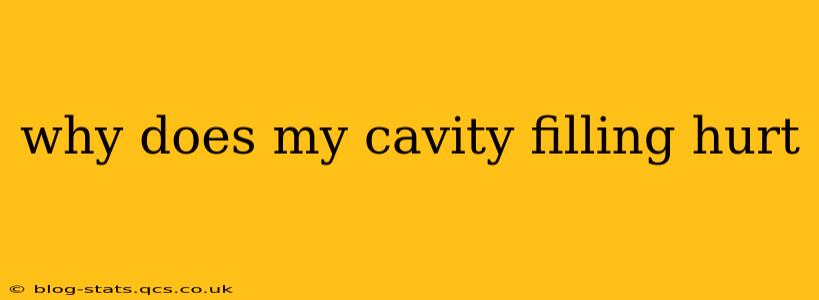A newly placed cavity filling shouldn't cause prolonged or severe pain. While some minor discomfort is normal in the immediate aftermath, persistent or intense pain warrants a call to your dentist. Let's explore the potential reasons behind post-filling pain and what you can do.
What Causes Post-Filling Pain?
Several factors can contribute to pain after a filling. Understanding these can help you communicate effectively with your dentist and address the issue.
Sensitivity to Temperature:
This is the most common reason for post-filling pain. The filling material itself, or the process of placing the filling, might have exposed sensitive dentin (the layer beneath enamel). Hot or cold foods and drinks can then trigger sharp, short-lived pain. This sensitivity usually subsides within a few days or weeks as your tooth adjusts.
Bite Problems:
An improperly placed filling can alter your bite, leading to discomfort. If the filling is too high, it can cause your teeth to clash, resulting in pain in the jaw, teeth, or even headaches. This requires a follow-up visit to your dentist for adjustment.
Infection or Irritation:
In rare cases, the filling procedure might have inadvertently irritated the tooth's pulp (the soft tissue containing nerves and blood vessels). This can lead to inflammation and pain, potentially indicating an infection. Symptoms might include throbbing pain, sensitivity to touch, and swelling. This requires immediate professional attention.
The Filling Material Itself:
While uncommon, some individuals might experience allergic reactions to certain filling materials, such as composite resin or amalgam (silver fillings). Symptoms can include persistent pain, swelling, or rash. If you suspect an allergic reaction, contact your dentist immediately.
Gum Irritation:
The filling process may have caused minor gum irritation. This is usually temporary and will subside on its own, but persistent gum inflammation needs evaluation.
How Long Should Post-Filling Pain Last?
Minor sensitivity to temperature is expected to resolve within a few days to a couple of weeks. Pain related to bite issues should also be addressed promptly by your dentist. However, any persistent, intense, or worsening pain signals a potential problem and requires immediate professional assessment.
When Should I See My Dentist?
Contact your dentist immediately if you experience:
- Severe or persistent pain: Pain that doesn't subside after a few days, or that intensifies.
- Throbbing pain: This often suggests inflammation or infection.
- Swelling: Swelling around the tooth or jaw is a significant warning sign.
- Sensitivity to touch: Pain when touching or biting on the affected tooth.
- Fever: A fever alongside tooth pain suggests a more serious infection.
Don't delay seeking professional help if you experience any of these symptoms. Early intervention can prevent more extensive and costly dental treatments.
Can Over-the-Counter Pain Relievers Help?
Over-the-counter pain relievers like ibuprofen (Advil, Motrin) or acetaminophen (Tylenol) can help manage mild discomfort. However, they don't address the underlying cause of the pain and shouldn't mask symptoms that warrant immediate dental attention.
What Can I Do to Prevent Post-Filling Pain?
Following your dentist's post-operative instructions carefully is key. This often includes avoiding very hot or cold foods and drinks for a few days. Maintaining good oral hygiene, including brushing and flossing gently, can also aid in preventing complications.
This information is intended for general knowledge and informational purposes only, and does not constitute medical advice. It is essential to seek professional advice from a qualified healthcare provider for any medical questions or concerns. Always consult with your dentist about any concerns regarding your dental health.
